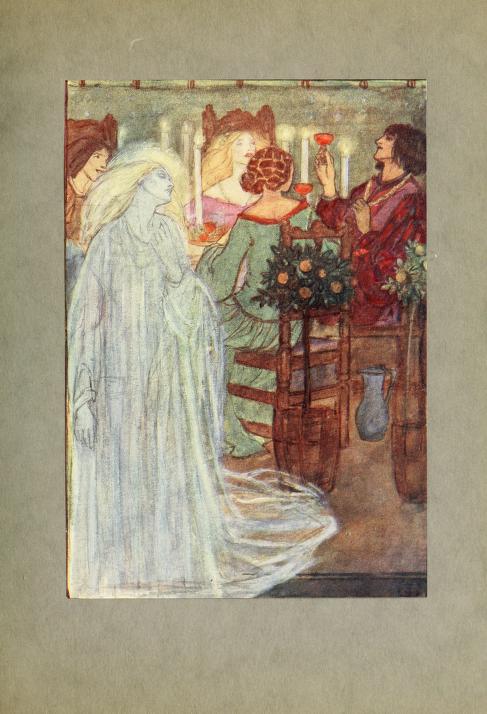Rossetti’s “At Home” (1858) was initially titled “After the Picnic.” but when her brother Dante declared picnics frivolous and insisted on a change, Ms. Rossetti complied.
It’s known Rossetti composed the poem after attending a real June picnic with her friends, the Bell Scotts in Newcastle. It was not a happy picnic because she imagined a sad situation in which the shade of a dead woman, visits her friends whose lives are fulfilled and happy. This imagery is typical of Rossetti, whose frame of mind was generally felt moody, unsure, and unloved.
Florence Harrison’s illustration depicts Rossetti shimmering in white. She’s invisible to her friends sitting behind her dining by candlelight. Harrison omits reference to the picnic under the orange tree boughs.
Contrarily, Jan Marsh, a Rossetti biographer, thinks the poem “has nothing to do with picnics.”
Featured Image: Florence Susan Harrison’s “At Home”
See Christina Rossetti. Goblin Market and Other Poems (Macmillan: London 1862); Florence Harrison. Poems of Christina Rossetti. Blackie and Son: London, 1910; https://archive.org/stream/poemsrosse00ross#page/n347/mode/2up; Jan Marsh. Christina Rossetti: A Literary Biography. (London: Faber & Faber, 1994); Georgina Battiscombe. Christina Rossetti: A Divided Life. (New York: Holt Rinehart and Winston, 1981); https://archive.org/stream/poemsrosse00ross#page/n347/mode/2up
At Home
When I was dead, my spirit turned
To seek the much-frequented house:
I passed the door, and saw my friends
Feasting beneath green, orange boughs;
From hand to hand they pushed the wine,
They sucked the pulp of plum and peach;
They sang, they jested, and they laughed,
For each was loved of each.
I listened to their honest chat:
Said one: ‘To-morrow we shall be
Plod plod along the featureless sands,
And coasting miles and miles of sea.’
Said one: ‘Before the turn of the tide
We will achieve the eyrie-seat.’
Said one: ‘To-morrow shall be like
To-day, but much more sweet.’
‘To-morrow,’ said they, strong with hope,
And dwelt upon the pleasant way:
‘To-morrow,’ cried they, one and all,
While no one spoke of yesterday.
Their life stood full at blessed noon;
I, only I, had passed away:
‘To-morrow and to-day,’ they cried;
I was of yesterday.
I shivered comfortless, but cast
No chill across the tablecloth;
I, all-forgotten, shivered, sad
To stay, and yet to part how loth:
I passed from the familiar room,
I who from love had passed away,
Like the remembrance of a guest
That tarrieth but a day.

